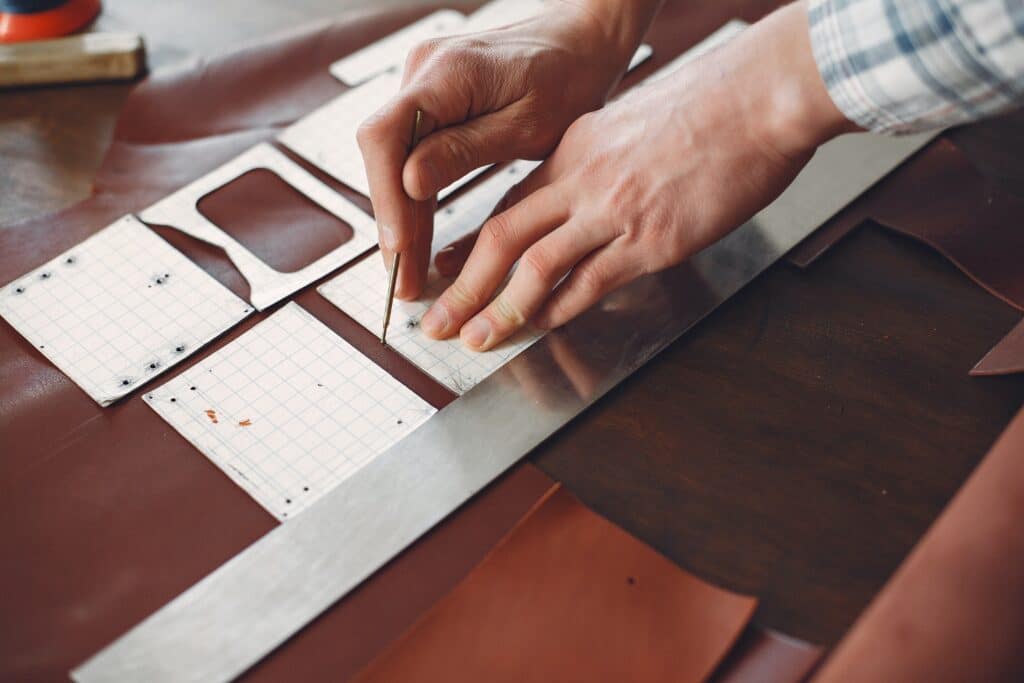Patternmakers are the unsung heroes of the fashion and apparel industry, playing a pivotal role in turning design concepts into tangible garments. These skilled artisans are the architects behind the perfect fit, ensuring that every clothing item meets the highest standards of quality and precision. In a world where clothing trends evolve at lightning speed, having a talented patternmaker on your team can be a game-changer for your company’s growth.
The success of your fashion business heavily relies on finding the right patternmaker who possesses a unique blend of hard and soft skills. While qualifications and technical expertise matter, it’s equally crucial to gauge their ability to adapt, innovate, and communicate effectively in a dynamic industry.
In this comprehensive guide, we will delve into the world of patternmakers, exploring their essential skills, how to assess them during the hiring process, and where to find these talented professionals. By the end of this blog, you’ll be well-equipped to make informed decisions and build a team that elevates your brand’s reputation in the fashion world. So, let’s embark on the journey to discover your next patternmaking virtuoso.
What is a Patternmaker?
A patternmaker is the meticulous craftsman behind the scenes, translating a fashion designer’s vision into wearable reality. This role is integral to the garment production process and holds the key to the perfect fit, style, and functionality of clothing. Patternmakers meticulously create templates, or “patterns,” which serve as the blueprint for cutting fabric and assembling garments. Here’s how this role contributes to a company’s growth:
- Precision and Fit: Patternmakers ensure that garments fit flawlessly, reducing the likelihood of returns and customer dissatisfaction.
- Quality Control: Their expertise in garment construction helps maintain high-quality standards, enhancing brand reputation.
- Cost Efficiency: By optimizing fabric utilization and minimizing wastage, patternmakers contribute to cost savings in production.
Roles and Responsibilities:
- Collaborate closely with fashion designers to understand design concepts.
- Develop precise patterns for different garment components, considering fabric properties.
- Create prototypes and samples for testing and adjustment.
- Make necessary alterations to patterns for sizing, style, and functionality.
- Stay updated on industry trends and innovations in patternmaking techniques.
- Communicate effectively with production teams to ensure accurate garment assembly.
In summary, patternmakers are the backbone of the fashion industry, ensuring that creativity meets functionality. Their contributions are crucial to a company’s growth, as they facilitate the creation of garments that not only look great but also fit impeccably and meet the highest quality standards.
Hard skills to assess in patternmakers
When evaluating candidates for the role of a patternmaker, it’s essential to focus on their technical proficiency and hard skills. These are the fundamental competencies that determine a patternmaker’s ability to create accurate and effective garment patterns. Here are the key hard skills to look for and how to assess them:
- Patternmaking Software Proficiency:
- Look for expertise in using industry-standard patternmaking software, such as CAD (Computer-Aided Design) tools.
- Assess their ability to navigate and efficiently utilize software features to create digital patterns.
- Understanding of Garment Construction:
- Evaluate their knowledge of garment construction techniques, including seams, darts, pleats, and grainlines.
- Ask candidates to explain how specific construction methods affect garment fit and design.
- Grading and Sizing Skills:
- Check their proficiency in grading patterns to create various sizes while maintaining proportion and fit.
- Request examples of graded patterns they’ve created for different clothing items.
- Fabric Knowledge:
- Inquire about their understanding of various fabrics and their behavior in patternmaking.
- Assess their ability to choose suitable fabric types for specific garment designs.
- Prototyping and Sample-Making:
- Request a portfolio showcasing their ability to create prototypes and samples from patterns.
- Evaluate the quality and precision of their prototypes to ensure they match the design specifications.
- Measurement Accuracy:
- Assess their skill in taking precise body measurements, as accuracy is crucial for creating well-fitting patterns.
- Ask for examples of how they’ve used measurements to develop successful patterns.
- Problem-Solving Skills:
- Present candidates with hypothetical pattern-related challenges and assess their problem-solving abilities.
- Evaluate their creativity in finding innovative solutions to pattern design issues.
- Technical Drawing Skills:
- Examine their proficiency in creating detailed technical drawings of patterns, including notations and annotations.
- Ensure that their drawings are clear and comprehensive for production teams.
By thoroughly assessing these hard skills, you can identify candidates who possess the technical expertise necessary to excel in the role of a patternmaker. Combining these technical competencies with soft skills like communication and adaptability will help you make the right hiring decision.
Soft skills to assess in patternmakers
Beyond technical proficiency, the success of a patternmaker depends greatly on their soft skills. These interpersonal and problem-solving abilities are equally crucial in ensuring effective collaboration and the seamless execution of projects. Here are the essential soft skills to evaluate and how to assess them:
- Communication Skills:
- Assess their ability to effectively convey ideas, instructions, and feedback to team members, including designers and production staff.
- Evaluate how clearly and comprehensively they can articulate their pattern-related decisions.
- Attention to Detail:
- Look for candidates who demonstrate an unwavering commitment to precision in patternmaking.
- Review their past work for instances of meticulous attention to detail, which is vital for achieving garment quality.
- Adaptability and Flexibility:
- Inquire about their willingness to adapt to changing design requirements or unexpected production challenges.
- Ask for examples of situations where they had to adjust patterns on short notice.
- Teamwork and Collaboration:
- Evaluate their ability to collaborate seamlessly with designers, sample makers, and other members of the production team.
- Seek feedback from previous colleagues or employers on their teamwork skills.
- Problem-Solving Aptitude:
- Present candidates with hypothetical pattern-related problems and assess their ability to identify solutions.
- Look for instances in their portfolio where they successfully resolved complex pattern issues.
- Time Management and Organization:
- Examine their capability to manage multiple patterns and projects simultaneously.
- Discuss their approach to organizing work, meeting deadlines, and handling time-sensitive tasks.
- Creativity and Innovation:
- Seek evidence of their ability to think creatively and innovate in pattern design.
- Ask about instances where they introduced novel techniques or approaches to improve patterns.
- Patience and Perseverance:
- Assess their patience in dealing with intricate patterns and challenging design concepts.
- Evaluate their capacity to persevere through revisions and adjustments.
Evaluating these soft skills is essential to ensure that your patternmaker not only produces high-quality patterns but also collaborates effectively with your team. A patternmaker with strong soft skills will contribute to a harmonious and productive work environment, ultimately benefiting your company’s growth.
How to test a patternmaker’s skills?
Testing a patternmaker’s skills is a critical step in the hiring process, ensuring that the candidate possesses the necessary technical competencies for the role. Here are various technical tests that can be used to evaluate a patternmaker’s skills and why they are important:
- Patternmaking Assignments:
- Assign candidates real or hypothetical patternmaking tasks relevant to your industry.
- Importance: This assesses their ability to create accurate patterns that meet specific design and sizing requirements.
- Pattern Digitization Test:
- Ask candidates to digitize a hand-drawn pattern using patternmaking software.
- Importance: This test gauges their proficiency in using digital tools, a crucial skill in modern patternmaking.
- Pattern Grading Exercise:
- Request candidates to grade a pattern for different sizes while maintaining proper proportions.
- Importance: Grading skills are vital for producing garments in various sizes without compromising fit or style.
- Sample Pattern Review:
- Provide candidates with sample patterns and ask them to analyze and identify potential improvements or errors.
- Importance: This assesses their attention to detail and problem-solving capabilities.
- Pattern Adjustment Challenge:
- Present a pattern with specific design modifications and assess how candidates adapt it.
- Importance: This tests their ability to modify patterns according to design changes, a common requirement in the industry.
- Fabric Matching Test:
- Ask candidates to select appropriate fabric types for different garment designs.
- Importance: Evaluating fabric knowledge ensures they make informed choices, which impacts garment quality.
- Time-Bound Pattern Task:
- Provide candidates with a pattern task with a tight deadline to assess their time management skills.
- Importance: Time management is crucial to meeting production schedules.
Using these tests, you can gain a comprehensive understanding of a patternmaker’s technical abilities. By selecting relevant assessments, you ensure that the candidate not only possesses the right skills but can also apply them effectively in a real-world work environment, contributing to the success of your company.

Where to find the best patternmaker?
Finding the perfect patternmaker for your team involves casting a wide net across various platforms and resources to attract the most qualified candidates. Here’s how to locate the best-suited candidates and leverage these platforms effectively:
- Job Boards and Websites:
- Post job listings on specialized job boards like Indeed, LinkedIn, and Fashion Jobs.
- Use targeted keywords in your job posting to attract candidates with specific patternmaking skills.
- Fashion Schools and Institutes:
- Collaborate with local fashion schools or institutes to connect with fresh graduates or experienced professionals.
- Attend career fairs or workshops to meet potential candidates face-to-face.
- Industry Associations:
- Engage with fashion industry associations and networks.
- Leverage their directories, events, and online communities to connect with experienced patternmakers.
- Freelance Platforms:
- Explore freelance platforms like Upwork or Freelancer to find experienced patternmakers who offer their services.
- Consider hiring freelancers for specific projects or to fill temporary gaps in your team.
- Online Portfolios and Social Media:
- Search for patternmakers on professional networking sites like LinkedIn, where they may showcase their portfolios.
- Explore social media platforms like Instagram and Pinterest for visual portfolios.
- Referrals and Networking:
- Tap into your industry network for referrals.
- Ask colleagues, peers, and mentors if they know of any qualified patternmakers.
- Local Tailoring and Sewing Communities:
- Visit local tailoring shops or sewing communities where experienced patternmakers may frequent.
- Engage in conversations and networking opportunities to identify potential candidates.
- Recruitment Agencies:
- Partner with recruitment agencies that specialize in the fashion and apparel industry.
- They can help identify and vet qualified patternmakers on your behalf.
By strategically utilizing these platforms and resources, you can increase your chances of finding the best patternmaker who aligns with your specific needs and contributes to your company’s growth and success in the fashion industry.
Template for a patternmaker’s job description:
About Us:
[Company Name] is a leading [Fashion Company/Fashion Design Studio/Manufacturing Company] dedicated to creating [high-quality/innovative/fashion-forward] clothing. We pride ourselves on our commitment to craftsmanship, creativity, and delivering exceptional products to our customers.
Responsibilities:
- Collaborate closely with our design team to interpret and translate their concepts into precise garment patterns.
- Create, modify, and adjust patterns for various clothing items, ensuring the perfect fit, style, and functionality.
- Digitize patterns using industry-standard patternmaking software.
- Grade patterns to develop different sizes while maintaining proportions.
- Work closely with our production team to resolve pattern-related issues and ensure smooth garment production.
- Stay updated on industry trends, emerging techniques, and technologies in patternmaking.
Qualifications:
- [X] years of experience as a patternmaker in the fashion industry.
- Proficiency in patternmaking software (e.g., [List specific software]).
- Strong understanding of garment construction, fabrics, and sewing techniques.
- Excellent knowledge of grading patterns for different sizes.
- Highly detail-oriented with exceptional problem-solving skills.
- Effective communication and teamwork abilities.
- [Bachelor’s degree/Associate’s degree] in Fashion Design or a related field (preferred but not required).
Why Join Us?
- Opportunity to work with a dynamic and creative team in the fashion industry.
- [Highlight any unique company culture, values, or achievements].
- Competitive salary and benefits package.
- [Mention any growth opportunities, projects, or initiatives that make your company stand out].
Benefits:
- [List specific benefits such as health insurance, retirement plans, etc.].
- [Include any unique perks your company offers].
Application Process:
Interested candidates are invited to submit their resume, cover letter, and a portfolio showcasing their patternmaking skills to [Email Address or Application Link]. Please include “Patternmaker Application” in the subject line.
Other Important Information:
- Application Deadline: [Specify the deadline if applicable].
- We are an equal opportunity employer and welcome candidates from all backgrounds to apply.
- [Additional details about your company’s hiring process, location, or any specific requirements].
Feel free to customize this template to match your company’s unique needs and culture before posting it on various job boards and sharing it with potential candidates.
Cost of a patternmaker in the US market
The cost of hiring a patternmaker in the United States varies based on experience and skill level:
- Entry-Level Patternmaker (0-2 years of experience): On average, an entry-level patternmaker can expect an annual salary ranging from $35,000 to $50,000.
- Mid-Level Patternmaker (2-5 years of experience): Mid-level patternmakers with a solid skill set can command salaries between $50,000 and $70,000 per year.
- Experienced Patternmaker (5+ years of experience): Highly experienced patternmakers, often with expertise in specialized areas, can earn annual salaries exceeding $70,000, with some reaching up to $100,000 or more.
It’s important to note that location, company size, and specific job requirements can influence compensation, but these figures provide a general overview of patternmaker costs in the US market.
Interview questions for patternmaker candidates
Interviewing patternmaker candidates requires a thoughtful selection of questions to assess their suitability for the role. Here are 15 questions categorized by soft skills, hard skills, and general skills, along with brief explanations of why each category is important:
Soft Skills:
- Communication Skills:
- “Can you describe a situation where effective communication was crucial in collaborating with a design team or colleagues?”
- Adaptability:
- “How do you handle sudden design changes or adjustments in patterns?”
- Problem-Solving:
- “Can you provide an example of a challenging pattern-related problem you’ve encountered and how you resolved it?”
- Teamwork:
- “Tell us about your experience working as part of a team with designers and production staff. How do you contribute to a harmonious work environment?”
- “How do you prioritize and manage your workload, especially when working on multiple patterns simultaneously?”
Hard Skills:
- Patternmaking Software Proficiency:
- “Which patternmaking software are you most comfortable with, and can you demonstrate your expertise in using it?”
- Garment Construction Knowledge:
- “Explain the key factors you consider when creating patterns for different garment types, such as dresses, pants, or outerwear.”
- Pattern Grading:
- “Can you describe your experience with pattern grading and its importance in garment production?”
- Fabric Expertise:
- “How do you select the appropriate fabrics for specific garment designs, and what considerations do you keep in mind?”
- Prototyping and Sample-Making:
- “Walk us through your process for creating prototypes and samples from your patterns. What details are essential in this phase?”
General Skills:
- Measurement Accuracy:
- “How do you ensure precision when taking body measurements, and how do you use these measurements in your patternmaking?”
- Technical Drawing Skills:
- “Can you provide examples of your technical drawings or notations on patterns?”
- Experience with Different Garment Types:
- “Have you worked on a wide range of garments, including formalwear, sportswear, or specialty items? Share your experience.”
- Quality Control:
- “What steps do you take to ensure that the patterns you create result in high-quality garments?”
- Pattern Modification:
- “How do you approach pattern modifications when there are design changes or alterations needed? Can you give an example?”
Asking these questions during the interview process will help you assess the candidate’s soft skills, hard skills, and general skills, ensuring that they are well-equipped to excel in the role of a patternmaker.
Assess for patternmaker skills to avoid mis-hires
In the competitive world of fashion and apparel, hiring the right patternmaker is not just about finding a candidate with the right resume—it’s about identifying someone who can seamlessly translate designs into perfectly fitting garments. Mis-hires can be costly, both in terms of time and resources.
One effective way to mitigate mis-hires is by incorporating talent assessment tools into your hiring process. These tools not only expedite the candidate evaluation process but also provide deeper insights into a candidate’s skills and capabilities.
Testlify is your go-to talent assessment solution for patternmakers. With our customizable assessments, you can test candidates on their patternmaking software proficiency, garment construction knowledge, grading skills, and more. Our platform streamlines the screening process, helping you identify the most qualified patternmakers quickly and efficiently.
Ready to make smarter hiring decisions and build a team of patternmaking experts who will elevate your brand? Schedule a demo with Testlify today and discover how our assessments can help you find the perfect patternmaker for your team. Don’t leave your hiring success to chance—assess for skills and avoid costly mis-hires.








